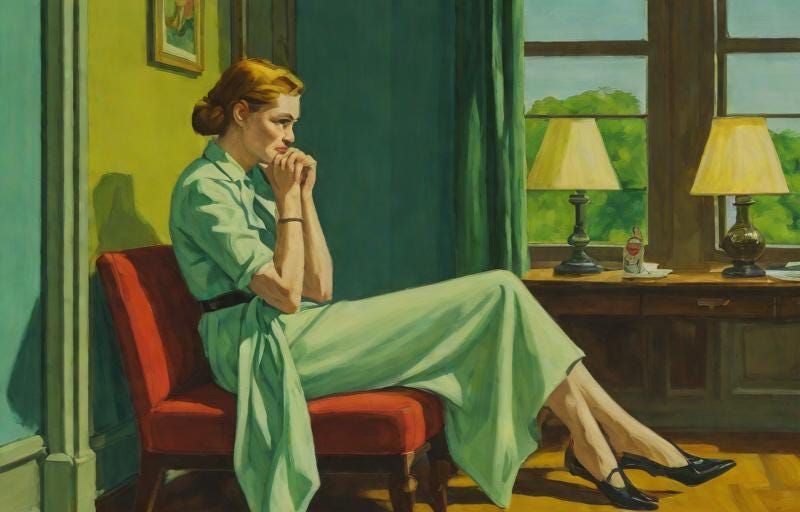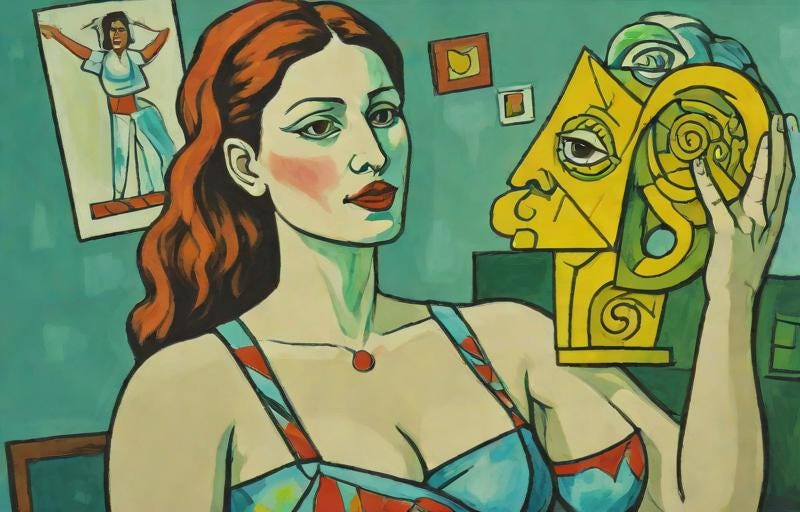When news broke that E. Jean Carroll won her defamation case against Donald Trump, and he was ordered to pay her $83.3 million, she stated:
“This is a great victory for every woman who stands up when she’s been knocked down, and a huge defeat for every bully who’s tried to keep a woman down.”
As someone who was married for eight years to a psychologically, emotionally, and, at times, physically abusive man, this speech resonated.
I posted E. Jean Carroll’s words on Substack Notes. Then a man who doesn’t use his real name commented:
“I’m from Mississippi and I don’t know any men around here that go around trying to keep women down. I do, however, know quite a few women who would just assume live off a man’s paycheck.”
He went on to say how gendered violence isn’t really a thing and that there is no data or evidence showing that women disproportionately suffer violence from men.
So I replied:
“Personal anecdote: Me, 8 years married to an abusive man, afraid to leave because of his threats. 1/3 of women have experienced sexual violence, plenty of data. And I was the breadwinner. Maybe you should talk to more women, bro.”
Surprise, bro didn’t like that and replied:
“So what? Women are the perpetrators of most child sexual violence. Stop being a victim.”
Classic, right? Women call out abuse, and now we’re the perpetrators and/or “playing the victim.”
Since that post, friends have told me 100% chance this man is a perpetrator of violence against women.
Notice how he turned the tables on me, just like Trump points fingers at anyone who points fingers at him. Just like the man I was married to would accuse me of doing what he was doing.
gas·light = manipulate (someone) using psychological methods into questioning their own sanity or powers of reasoning.
Back then (2002-2010), the term “gaslighting” wasn’t commonplace. If it had been, maybe I would have realized I wasn’t crazy.

Women continue not to be believed (see Johnny Depp v. Amber Heard, Brett Kavanaugh v. Christine Blasey Ford, Clarence Thomas v. Anita Hill.) Women call out abuses and are accused of being the perpetrators or “playing the victim.”
It’s a bummer that Mississippi guy is not an anomaly. The case of E. Jean Carroll was a huge step toward believing women, but we still have a long way to go.
Taylor Swift talked about this in response to her song "Mad Woman" from Folklore: The Long Pond Studio Sessions:
"The most rage provoking element of being a female is the gaslighting that happens when, for centuries, we've been just expected to absorb male behavior silently. Right? Silent absorption of whatever any guy decides to do. And often times when we, in our enlightened state, in our emboldened state now, respond to bad male behavior or somebody just doing something that was absolutely out of line and we respond, that response is treated like the offence itself.
There's been situations recently, somebody who's very guilty of this in my life, it's a person who makes me feel- or tries to make me feel- like I'm the offender by having any kind of defense to his offences. It's like, oh, I have absolutely no right to respond or I'm crazy. I have no right to respond or I'm angry. I have no right to respond or I'm out of line.
Why patriarchy is bad for men:
Patriarchy is one of the single largest threats to men’s mental and physical health, according to Connections for Abused Women and their Children. (This was the first place in the country to establish a shelter for battered women and their children and to establish a domestic violence hotline.)
How so?
Patriarchal ideas about masculinity harm men. Men who subscribe to this more “traditional” notion of manhood mean men are more likely to get hurt or sick and less likely to seek help when they are. In Alaska, what is known as “rugged individualism,” which I wrote about here, means men are more isolated. They are more likely to act overly tough, controlling, and aggressive, all factors that harm their health.
The website of Connections for Abused Women and their Children explains:
Patriarchy harms men by disconnecting them from their emotions, and frames seeking support as weakness. It’s an endless pressure for men to conform to a narrow prescription of masculinity, to compete with one another, and to prove their manhood by surrendering their individuality and denying their humanity. It’s also the pressure to take risks, to ignore one’s health, and to cope through substance use.
Unsurprisingly perhaps, worldwide, the life expectancy for men is around three to four years lower than that of women.
Patriarchy is killing men:
Men in Alaska, Wyoming, and Montana experience twice the amount of suicide and alcohol abuse than men in the rest of the country. The next highest places for male suicide all fall in mountain time zones: New Mexico, Idaho and Utah. Again, the culture of rugged individualism.
Smashing patriarchy saves lives (and we haven’t even begun to talk about how patriarchy harms the LGBTQ+ population)!
Save a life and smash the like button below so more people can read this post! Share this with your husbands, brothers, fathers, sons, wives, daughters, mothers, and sisters!
Women nurture and care for us. By uplifting our mothers, wives, sisters, and daughters, we uplift ourselves. The more empathy we show for others, we show for ourselves and the kinder we are with ourselves.
For more, check out my interview with Elissa Bassist, author of the brilliant and hilarious Hysterical about patriarchy and own attempts at smashing it.
In solidarity,
Summer
Thank you for reading The Feral Stack! If you liked this post, please smash the heart button so more people can discover it.
You can also help support by re-posting this or sharing it with a friend. Ty!








Thank you for this fantastic post. When I used to teach an undergrad intro to Philosophy course, I included Crystal Eastman's "Now We Can Begin," where she discusses men's "privilege of helplessness" and "cultivated ignorance" when it come to doing simple things that any independent person should be able to do (i.e. cooking, laundry, dressing themselves). Some male students would shrug it off and chuckle until I asked the entire class (rhetorically) if their fathers knew how to cook or work the washing machine; it got uncomfortable when I said "Everyone in this room -- women included -- considers themselves independent, but how many of you actually know how to do your own laundry, or can cook beyond boiling water or using the microwave. How independent are you, actually?" It created an "in" to discuss patriarchy without everyone getting defensive.
Thanks again!
As a male who never joined the men's club, I've been a kind of embedded observer among men for my entire life, and what you say is largely true, and often sad, because men with a certain degree of intelligence know it's a facade even as they participate in it. Talking in dehumanizing terms about women, but they've got wives who they love, and daughters they adore. It splits their minds into compartmentalization. I've heard men talk about their wives' small breast size with a downcast tone, and the talk is for the sake of this fake male ethos. Then Trump is caught boasting about his narcissistic aberrant behavior and gets elected President anyway, which was incomprehensible, but this is where we are. So E. Jean Carroll is a big thing, but only for those who pay attention. Those male minds that are OK with what Trump said still will be. A good spokesperson for men would be a refreshing thing - I wish George Clooney would run for president. One point - Alaska, Wyoming, and Montana are also isolated, economically challenged, very cold states, conditions which lead to depression, alcohol abuse and suicide. And there are guns everywhere. So there are likely many other factors involved in the suicide numbers.